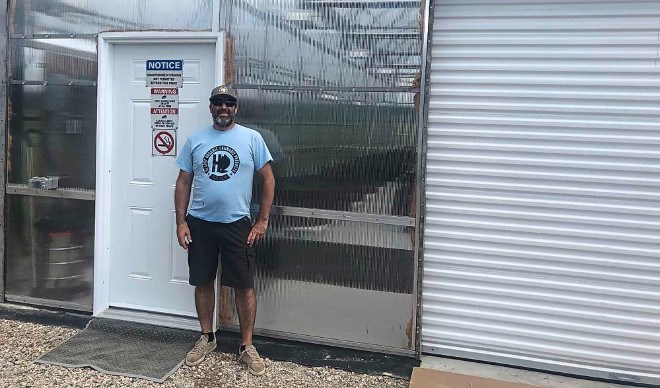Before Joël Lacelle decided to move into cannabis cultivation, he lived life on the road.
As a diamond exploration driller for Iron Ore Company of Canada (IOC), he was working 30 days on site in Labrador City, with 12 days off, travelling back and forth from his home in Hearst.
Though he loved the work, the lifestyle was taking a toll on his personal life.
“I was never home; that’s the problem,” said the 43-year-old, who previously worked as a truck driver. “When I was younger, it wasn’t too bad, but now that I have a family, my kids are getting older and it’s nice to put some roots close to home.”
Reigniting his twin passions for gardening and entrepreneurship, Lacelle started working toward a new goal: earning a cannabis micro-cultivator licence from the federal government.
By June 2018, he had begun construction on a 1,200-square-foot greenhouse where he hoped to eventually legally grow cannabis for commercial sale.
Want to read more stories about business in the North? Subscribe to our newsletter.
It was just an aspiration at the time, because the federal government hadn’t yet made cannabis legal in Canada. That would come five months later, in October, 2018.
But Lacelle was determined to get ahead of the game.
“I kind of was decided and I said, look, no matter what, if it doesn't come to anything, I'll grow cucumbers,” he said. “I was building a greenhouse.”
His gamble paid off.
On July 12, after more than a year of hard work, Lacelle and his business partner, Miguel Lachance, under the name Hearst Organic Cannabis Products, were approved by Health Canada to become one of the country’s first operators to legally micro-cultivate cannabis for commercial sale.
Hearst Organic spent months going back and forth with Health Canada, which closely examined the company’s business plan, site security measures, greenhouse construction methods, and more before giving its stamp of approval.
Cannabis is considered a “craft” product when it’s produced in small batches. Lacelle said each plant gets personal attention – from pest management to watering to harvesting – and so the quality tends to be higher than with large-scale productions.
“The idea is to have that best product out there,” he said. “You don’t have to have a lot of it; you just have to have the best product.”
An estimated $700,000 has been invested to date in the enterprise – a combination of personal capital, a line of credit, and a small business loan from the Canadian Agricultural Loans Act.
It’s often been an onerous process, but Lacelle believes getting ahead of the application process worked in the company’s favour.
“(Health Canada) saw that we were serious and we had our building up,” he said. “When we got our confirmation of readiness, we were 95 per cent built.”
Micro-cultivation limits growers to 2,150 square feet of indoor or outdoor operations.
The Hearst Organic greenhouse – manufactured by Harnois Industries of Saint-Thomas, Que. – sits on a heated cement slab, and a furnace blows hot hair through a duct system to keep the plants warm. Heat lamps, blackout curtains and thick insulation provide extra protection through even the coldest Hearst weather.
By August, Lacelle said about 300 plants were happily thriving in their new home, and he expected to be ready for his first harvest in the fall. With a growing cycle of roughly three months, each plant should have about four harvests per year. When fully operational, Lacelle anticipates producing roughly 500 to 600 kilograms of product annually.
Once harvested, the dried cannabis flowers will then be shipped to BC Craft Supply Co., a Victoria, B.C.-based craft cannabis supplier that came calling with an offer of distributorship in July, just days after the company received its licence.
“The biggest thing is the packaging,” Lacelle said. “For me, it’s to get my product through processing and packaging with my logo on it and some of their market…. So for me that was helping me out.”
For now, the company employs three, including the cofounders, but Lacelle said he’ll need to hire at least two more people come harvest time.
As demand dictates, he’s already considering plans to expand the business, but he believes in the old idiom that you have to learn to walk before you can run.
Most importantly, Lacelle is proud to have carved out a niche business in his home community, in a region that has been beset by sawmill closures, leaving too many out of work.
“For us, it’s not about getting rich tomorrow,” he said. “It’s for creating a nice family business, a good product, something that we can put on the market and everybody’s going to enjoy.”




